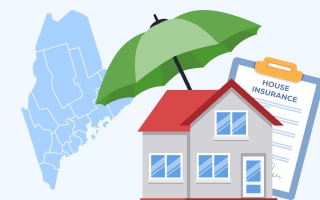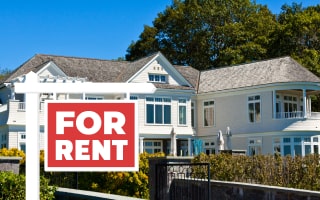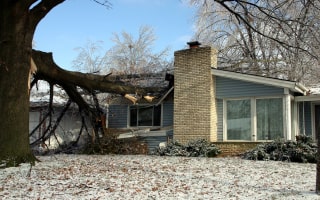Homeowners Insurance in Maine

Located in the country's far Northeast, Maine is subject to hurricanes and horrendous winter storms, lightning issues, and floods, causing all kinds of damage to property. Although Maine is considered a reasonably safe state, being so far north, it has many winter events. Since 1953, Maine has had 56 federally declared disasters, and the rate of disasters per 1 million people is 39.94, which is considerably higher than other states, even those in weather-heavy areas.
Although no U.S. state requires homeowners insurance, officials highly suggest everyone owning property has some coverage. If you borrow money to buy a home in Maine, your financial provider will demand that you purchase specific coverage and keep your policy active for the life of the loan.
The average rate for homeowners insurance in Maine is $1,305 a year, which is far less than the national average of $2,511/year. Maine is a very affordable state for home insurance.
Types of Homeowner Insurance Coverage Available in Maine
Every state operates slightly differently with its own laws and available options. Maine is a relatively low-risk state with plentiful home insurance providers offering specific coverage to fit the area. The types of coverage available in Maine include:
-
Dwelling Coverage: Dwelling coverage protects your home against covered perils. If a windstorm destroys your house, the insurance will pay to rebuild or repair it.
-
Personal Property: Personal property coverage pays to replace your belongings if they are destroyed or stolen.
-
Liability Coverage: If someone gets hurt on your property due to your negligence (e.g., falling on icy steps), this coverage will pay your legal bills if they sue you.
-
Medical Payments: Medical payments pay someone's medical bills if they are injured on your property.
-
Other Structures Coverage: Other structures coverage pays to rebuild detached structures like fences, pools, sheds, and garages.
-
Additional Living Expenses (ALE): After a qualifying event, if you must leave the house while it is repaired, ALE insurance will pay your expenses (food, lodging, pet boarding, laundry, travel, etc.) until you can return home.
Maine has a lot of coastline, so flooding is also a concern. Consider specialized flood insurance or an umbrella policy.
FEMA (Federal Emergency Management Agency) manages the National Flood Insurance Program (NFIP) through a network of 50 providers across the U.S.
Since most homeowners insurance does not cover floods, this supplemental coverage can repair damage and replace items after a flood. Depending on the options you choose, it can cover the building and/or your personal belongings. This program is available to homeowners, renters, and businesses. Learn more about the program on FEMA's website.
Home Insurance and Natural Disasters
Homeowners insurance rates are rising due to multiple natural disasters and continued severe weather issues nationwide. Climate change is the main driver for home insurance rates, even in places like Maine. As this trend continues, more insurance providers are going bankrupt and leaving crucial markets without any insurance.
Home insurance rates have climbed by 34% across the U.S. and, in some areas, as much as 60%. In Maine, home insurance rates have increased by 11.7%, lower than most areas of the country.
Hurricanes, winter storms, wildfires, and floods are Maine's most dangerous perils. In 2023, Maine also suffered one tornado and 730 wildfires, destroying 425 acres of land. From 1980 to 2024, Maine has had only 19 billion-dollar disasters, which is far less than most states. From 2015 to 2019, Maine insurers lost $172,670,200 in claims. Each wildfire or lightning damage claim costs insurance providers $77,340. Water damage and freezing claims average $11,650, and wind and hail cost home insurance firms $11,695 per incident.
How Can I Save on Homeowner Insurance Premiums in Maine?
To save money on home insurance premiums in Maine, you first must understand what factors impact them. Many things affect your homeowners insurance rates; they are as follows:
-
Your Location: Where you live matters the most. If you live in an area with frequent storms or high crime, you will pay more than in a mild climate with little to no crime.
-
Size of Your Home: The size of your house also matters. The larger the house, the more it will cost to rebuild and, therefore, the higher your rates will be.
-
Condition of Your Home: If your home is well-maintained, it will cost less to insure it than if it is in poor condition.
-
Financed or Not: If you own your house outright, you get to decide how much coverage you will purchase. If you have a mortgage, your lender will dictate your coverage levels, which might be more than you would like.
-
Levels of Coverage: The more coverage you have, the higher the price.
-
Your Deductible: The higher your deductible, the lower your rates. Conversely, if you choose a low deductible, you will pay more.
-
Cost of Materials & Construction: The cost of construction materials and labor keeps increasing, which is also a factor. If the house needs to be rebuilt, everything will be more expensive.
-
Your Credit Score: People with poor credit will pay more for insurance than those with good credit scores.
-
Risks: The higher your risk, the more you will pay. If you have "attractive nuisances" like pools, hot tubs, and trampolines on your property, your premiums will be higher.
Some ways to save on your homeowners insurance rates are:
- Avoid High Risk: To save money, remove anything on your property that poses extra risk.
- Raise Your Deductible: Increase your deductible as comfortably as possible to reduce your premiums.
- Improve Your Credit Score: Improve your credit to save money on your rates.
- Install a Security System: Install a high-end security system to make your home safer and earn lower rates.
- Make Home Improvements: Replace the roof and install storm windows and shutters for reduced insurance rates.
- Don't File Small Claims: Don't file for small claims; wait for the big ones. Even one claim could increase your rates by 20%.
- Ask for Discounts: Ask your provider for other discounts they offer that you might qualify for.
- Ask Around: Ask friends and family for recommendations for solid insurance firms that offer low rates.
Home Insurance Discounts in Maine
Home insurance in Maine is protection against covered perils. If your house is destroyed or damaged by a covered event, the insurance will pay to fix it or replace it. Most policies also cover other structures, personal property, liability, medical payments, and additional living expenses insurance.
You can obtain a policy quite easily by calling the firm's 800 number, visiting their website, applying online, or finding a local agent to work with. An agent might be able to help you better determine the coverage you need because it can be complicated. After you decide on the company and coverage, you must pay the first year in advance. Then, you can pay monthly through your escrow or once a year.
Some standard home insurance discounts offered by the most reputable providers include:
- Military or Vet Discounts: Many firms offer discounts for veterans or active military personnel.
- Senior Discounts: Seniors can also get discounted insurance rates for being a certain age.
- Bundling Discounts: If you bundle multiple policies with the same company, they usually discount your rates.
- Loyalty Discounts: If you stay with the same firm for many years, your rates may decrease over time.
- Claims-Free Discounts: Stay claims-free for a long time and enjoy lower rates.
- Payment/Paperless Discounts: Sign up for auto payments or paperless statements, and your insurer could shave a few dollars off your premiums.
- Security/Home Safety Discounts: Install a security system or safety features like smoke alarms and sprinklers to save money on your premiums.
- New Home Discounts: Build a new home, and you will pay up to 40% less on your insurance.
- Non-smoker Discounts: If you are a non-smoker, your fire risk is lower, and so will your rates.
- New Roof Discounts: Install a new, sturdier roof that better handles storms, and you could save money.
Common Rates Offer by Homeowners Insurance Firms
Newly constructed homes cost far less to insure, sometimes up to 40% less. This is because they are fabricated using modern materials and processes that meet local building codes. They should stand up to weather better and are easier to restore if damaged. Homes under five years old can save up to 26% on home insurance.
The average amount for new home insurance in Maine is $1,020 a year, or $85/month. However, your actual price will depend on many things, like your age, credit score, location, and the firm you choose.
Top 10 Home Insurance Firms in Maine and Average New Home Savings
| Company | % savings |
|---|---|
| Nationwide | 76% |
| State Farm | 51% |
| USAA | 54% |
| Travelers | 63% |
| Allstate | 47% |
| Chubb | N/A |
| Amica Mutual | N/A |
| The Hanover Insurance Group | N/A |
| Cincinnati Insurance | 52% |
| Concord Group | N/A |
Home Insurance and Renovations in Maine

Home renovations can invite warmth and comfort into your lives but can also significantly impact your home insurance rates. Some upgrades actually lower your rates, and others increase them. A few can do both, essentially creating a zero net effect.
![]() Home Renovations that Increase Rates
Home Renovations that Increase Rates
Some home renovations that increase your insurance rates include:
- Upgrade Kitchen or Baths: Upgrading kitchens or baths will make your home shine, but it will also increase your insurance rates, especially if you install luxury fixtures or appliances.
- Adding a Fireplace: Adding a fireplace extends the cozy factor but increases the fire risk, which will raise your insurance.
- Hot Tub/Fountain/Pond: Hot tubs, ponds, fountains, and trampolines are considered "attractive nuisances" and will add to your insurance premiums.
![]() Home Renovations that Decrease Rates
Home Renovations that Decrease Rates
Some home renovations that decrease your insurance rates include:
- Upgrade Wiring or Plumbing: Old wiring can result in fires, and deteriorated plumbing can leak and cause water damage. Upgrading these items will make your insurer feel better, and they may decrease your rates as a bonus.
- Smoke Alarms & Sprinklers: Installing smoke alarms, fire extinguishers, and sprinklers will help reduce your annual home insurance bill.
- Install Hurricane Shutters: Hurricanes affect nearly every part of the U.S., so installing hurricane shutters, a more substantial roof, or shatterproof windows will help you save on home insurance.
Home improvements and upgrades are not covered by homeowners insurance; you must pay for them yourself. Home insurance only pays to replace or repair your home after a qualifying event. However, if someone gets hurt during your renovation or steals something, you are covered for those. You should consider a temporary contractor's insurance policy during renovations to cover other damage.
It is best to discuss any home renovations with your insurance agent before starting work. Ask how they will impact your coverage, limits, and rates. The agent may want to review the work afterward to reassess your policy.
Maine Renters' Insurance

Maine renters insurance protects people who rent apartments, condos, and houses. It pays to replace their belongings after a covered event. Most renters policies also include liability protection, medical payments, and loss of use (ALE). The main goal of renters insurance is to replace your belongings if they are destroyed or stolen.
Renters insurance in most areas is pretty affordable. Three main things factor in when pricing renters insurance:
-
Location: You will pay less for renters insurance if you live in a safe place with few natural disasters. If you live in a city where crime is higher, you will pay more.
-
Coverage Limits: The more coverage you opt for, the higher your premiums will be.
-
Number of Units: The more units in your building, the less renters insurance you pay.
Maine renters pay an average of $12/month or $144/year, which is very affordable but not the cheapest in the country. The national average renters insurance cost is $215/year.
Condo Insurance in Maine

Everyone should have homeowners insurance, even condo owners. However, condo insurance is slightly different than homeowners. The difference is that each condo association has a master policy that covers the building and structure of the home. If anything happens, like a fire, the master policy will pay to rebuild the building and bring it back to its original condition (whenever it was first built). That means any upgrades made by condo owners (flooring, fixtures, appliances, cabinets, etc.) will not be covered. That is where condo insurance comes in. Condo insurance has dwelling coverage that is "interior only" and will restore all those upgrades back to their most current condition. Condo insurance also includes personal property coverage, liability protection (only if the person is hurt inside the condo), medical payments, and loss of use.
Renters insurance does not have any dwelling coverage, but condo insurance does, but it is only "walls-in", meaning it covers only the inside of the condo. It will replace things like:
- Appliances
- Wiring
- Plumbing
- Furniture
- Fixtures
- Interior Walls
- Countertops
- Cabinets
- Personal Possessions
The average cost of condo insurance in Maine is $30/month or $362/year. That is slightly less than the national average of $38/month or $455/year.
You can save on condo insurance by following the tips below:
- Raise Your Deductible
- Bundle Your Policies
- Install Security/Safety Features
- Opt-in for Paperless Statements and Autopay
- Limit Your Coverages
- Skip Small Claims
- Remain Loyal to the Same Firm
Maine Home Insurance Market
Maine is one of the few states where the home insurance industry remains profitable. Although insurance providers have seen enormous profits for the past ten years, as of 2023, claims consumed almost all of the revenue earned from the past ten years. If this trend continues, insurers will start to experience massive losses, and some will stop offering coverage in the state. There is plenty of competition right now, but as fewer insurers provide coverage, it will slim and make it harder for residents to find coverage.
Hurricanes and harsh winter storms are the main reasons for the high claims and revenue consumption of 2023. These weather patterns are projected to continue and even worsen in future years, making it difficult for any insurance carrier to remain afloat.
No federal agency regulates the home insurance industry. Instead, each state appoints a department to monitor providers and complaints and sanction those violating the industry's laws and ethics. In Maine, that agency is the Bureau of Insurance, located at 34 State House Station, Augusta, ME 04333.
Homeowners Insurance Guide
- Homeowners Insurance in Maine
- Types of Homeowner Insurance Coverage Available in Maine
- Home Insurance and Natural Disasters
- How Can I Save on Homeowner Insurance Premiums in Maine?
- Home Insurance Discounts in Maine
- Home Insurance and Renovations in Maine
- Maine Renters' Insurance
- Condo Insurance in Maine
- Maine Home Insurance Market
Instant Access to Maine Property Records
- Owner(s)
- Deed Records
- Loans & Liens
- Values
- Taxes
- Building Permits
- Purchase History
- Property Details
- And More!
Homeowners Insurance Guide
- Homeowners Insurance in Maine
- Types of Homeowner Insurance Coverage Available in Maine
- Home Insurance and Natural Disasters
- How Can I Save on Homeowner Insurance Premiums in Maine?
- Home Insurance Discounts in Maine
- Home Insurance and Renovations in Maine
- Maine Renters' Insurance
- Condo Insurance in Maine
- Maine Home Insurance Market